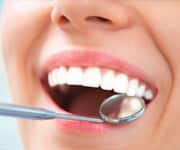Life Extension Magazine®

Dr. Sanda Moldovan, a periodontist/nutritionist who practices in Beverly Hills, California, and New York City, sees a direct link between nutritional intake and oral health. A specialist in dental implants, Dr. Moldovan came to the US from Romania at age 14 and holds degrees in dentistry, including periodontics and oral biology. In addition, she holds a CNS degree (Certified Nutrition Specialist). Dr. Moldovan recently spoke exclusively with Life Extension about the critical importance of maintaining optimal oral health for well-being and longevity.
LE: For most people, oral health is an afterthought. If they have a cavity, they get it filled…end of story. But oral health plays an essential daily role in our overall health and well-being.
SM: Yes. The mouth tells us a story, not just about disease, but also about people’s habits and their past. The mouth is a gateway into one’s health. For example, I may see somebody with teeth that are really worn out. What does this tell me? Chances are, this patient may be bulimic and the acid erosion behind the teeth gives us a snapshot about their daily health.
LE: What is the impact of poor oral care on the body?
SM: Periodontitis has been linked with a higher risk of heart attacks, strokes, and lung infections (especially in nursing homes), pregnancy that leads to low-weight babies, erectile dysfunction, and a few forms of cancer, including pancreatic cancer.
LE: What diseases elsewhere in the body can be detected in the mouth?
SM: Today we have saliva testing for diabetes, cancer, hepatitis B, hepatitis C, and HIV, and some of them are already commercially available. Twenty percent more people go to a dentist than a doctor, so saliva tests at the dentist’s office can often alert us to a nascent problem before the person sees their doctor. We can diagnose diabetes, which may show up as bleeding gums; HIV, which shows as a bluish lesion on the roof of the mouth; hyperparathyroidism, which shows up on x-rays as bone irregularity and teeth moving from their positions; hormonal issues, which may cause gingival growths and/or tumors (often in people who don’t brush their teeth); menopause (through a burning mouth), and in the case of leukemia, we see people who have good oral hygiene who suddenly get bleeding gums; changes in gum color may indicate sickle cell anemia; and a coated tongue, bluish gums, and increased salivation may be caused by metal intoxication, possibly from mercury or lead.
LE: Which nutrients are the most important for oral health?
SM: Many nutrients are essential for good oral health. Keeping bone and soft tissue healthy may require different nutrients. Bone requires more minerals than just calcium. When I tell some patients that the bone in their jaw is not solid enough, they say, “Oh, I should take more calcium,” but it’s much more than that. It’s the vitamin D level [which is necessary] for the calcium to be absorbed and it’s magnesium, boron, silicon, zinc, manganese, and a lot of trace minerals that are vital for bone formation and mineralization.
Oral soft tissues such as the gums are exposed every day to many different foods that are actually causing injuries. We injure our mouths daily with hot foods or crunchy foods, and we often don’t even feel these minor injuries. So we need to repair them with vitamins A, C, and E, which aid in regeneration of the gums and soft tissues.
We are entering the age of personalized medicine and nutrition and should realize that not everyone should take the same supplements. I often have patients keep a four-day diary of everything they eat, so I can gauge what is going on. But the best approach is by doing a nutrition analysis, either via urine or blood, to see exactly where each specific person is deficient and discover what they need. Then they should only supplement with what they’re missing to bring levels up to optimal status.
LE: Are these tests and changes all done prior to the surgery so a patient’s nutrition level will be conducive to rapid healing?
SM: Usually, unless someone has an emergency and there’s no time.
LE: After testing your patients’ nutrient levels, do you recommend how much of each supplement they should take?
SM: Yes. Typically, when somebody’s healing, they require a little bit more than normal. So for a period of one month after oral surgery, we boost those levels even higher to be sure they get adequate amounts.
LE: How do you advise patients to care for the teeth and mouth?
SM: I recommend brushing two minutes twice a day and water flossing. Most people do better with an electric brush because it does the work for you, but not just any electric brush. I recommend one with a sonic motion, such as the Waterpik Sensonic®. The ones with rotating heads can be very abrasive. I don’t like plastic picks that go in between the teeth, because they go only in one direction. The newest Waterpik Water Flosser ® does a much better job than manual flossing because the water flows under the gums and all the way around the tooth. And there is impressive data to back it up. For example, when researchers did the first clinical study comparing the Waterpik Water Flosser to string floss they found that water flossing removed more plaque and was up to 50% more effective for improving gum health. In a later 2009 independent study at the University of Southern California Center for Dental Biofilms, using scanning electron microscopy (SEM), researchers demonstrated that the Water Flosser removed up to 99.9% of plaque biofilm from the treated area in just three seconds.

Another 2013 independent study added to the clinical evidence. Test subjects using a Water Flosser in conjunction with a manual toothbrush had up to 29% better reduction in plaque biofilm than people who used a manual toothbrush and string floss.
Be sure to see your dentist every six months, or more often if you have periodontal problems. Also, do a self-assessment oral test, where you look in the mirror and see what’s going on in your mouth. If you notice anything unusual, make an appointment with your dentist. If you have pain somewhere, don’t ignore it. Sometimes infections of the mouth affect the whole body. Bacteria circulate and move, so don’t let it go. I often see infections extending all the way up into the sinus and causing problems that can make you feel sluggish or worse. It’s very important to know what’s going on in your mouth.
LE: What about toothpaste and mouthwash? How can you choose from so many products?
SM: I recommend natural toothpaste without fluoride. In certain cases, I believe fluoride should be used as a treatment but only when someone is prone to cavities. If fluoride is needed, it should be placed in a tray in the mouth to prevent swallowing. I don’t recommend a mouthwash with alcohol because the pH of most is too low and actually demineralizes teeth. The pH of something like Listerine® is 3.5 and at that pH, if someone swished several times a day, it would definitely cause demineralization of the teeth. I don’t recommend a mouthwash unless it’s for special situations, such as dry mouth or a lesion in the mouth that requires something extra.
LE: Why do many dentists recommend fluoride products?
SM: Fluoride kills bacteria and remineralizes teeth. But today we have better ways to remineralize, including MI Paste™, an effective toothpaste containing calcium and phosphate.
LE: What about gum care? What do bleeding gums mean and how can they be reversed?
SM: Bleeding gums can indicate nutritional deficiencies, perhaps of vitamin C, but they also can be caused by serious systemic problems such as leukemia. They may result from gingivitis, a local infection where bacteria are getting inside the gum, or a step above that, periodontitis, or gum disease, which affects bone surrounding the teeth and is a slow, chronic low-grade infection that needs treatment. The best way to prevent or treat gum disease is by brushing twice a day, water flossing daily, and seeing your dentist or periodontist every six months.
LE: Bisphosphonates, a class of drugs found in Boniva® and other medications for osteoporosis have been linked to cancer of the jaw. What should we know about them?
SM: The latest study by Merck, the company that makes Boniva, found that after seven years of taking a medication with bisphosphonates, like Boniva, the risk of fracture increases. It does the opposite of what it’s supposed to do, which is to support bone growth and prevent fractures. I always have a conversation with physicians when I see they’ve put patients on these drugs because these drugs can cause disturbances in bone metabolism to the point where when I do surgery, it obstructs healing. We see bone in the mouth actually dying, with no ability to heal, especially for those on high doses of bisphosphonates.
LE: How do you work with patients that are on these medications?
SM: I ask why they are taking the medication and how long they’ve been on it. It may be a treatment for cancer or osteoporosis. Then I talk with their physician about taking them off the medication, at least for a period of a few months until the bone can recover a little, so I can do my procedure. Most patients are unaware of this side effect.
LE: How does oral cancer develop? What are the symptoms and how can it be prevented?
SM: Oral cancer is one of the most common cancers today because of widespread infection with human papilloma virus (HPV). It used to be tobacco that caused most cancers of the mouth, but most head and neck cancers are associated with chronic HPV infection, a virus that currently may only be controlled by maintaining high levels of natural killer cell activity. We do annual cancer screenings in the dental office. The cancer often develops on the side of the tongue, usually with white patches. I recommend everyone do a self-examination at home at least every six months. Use a small flashlight and look in your mouth; look at the insides of the cheeks and check each side of the tongue by pulling it to one side and then the other. Check underneath the tongue and look for white patches that can’t be rubbed off or sores that don’t hurt. Canker sores are very painful and will usually heal within 10 days. Smokers should do these self-exams more often, since they have a higher rate of oral and throat cancer.
LE: What other oral health problems should we look for?
SM: Mouth sores [that are] related to food allergies. The mouth is the opening of the digestive tract and digestion starts in the mouth. For example, if you are gluten intolerant, you probably have sores in your intestinal tract, but they can also show up in the mouth as small, painful recurrent canker sores. Burning mouth syndrome is another sign and can also be a sign of systemic local allergy. Sometimes it’s even from cinnamon toothpaste or gum, since some people are allergic to cinnamon.

LE: What about bad breath?
SM: Bad breath can indicate gum disease, but it could go deeper, such as a problem related to overgrowth of bacteria where the stomach and esophagus meet. In such a case, we look at the teeth. If we don’t see an infection, we look deeper. It shouldn’t be ignored. People cover up bad breath with lozenges, sprays, and mouthwashes, but if there’s something off, have it checked.
LE: What does a red tongue often indicate?
SM: People with a red, fiery tongue usually have an iron deficiency. Some also get redness at the corners of their mouth. That could mean a yeast overgrowth that extends beyond the mouth, often all the way to the intestinal tract, which requires a more systemic detoxification. Redness in the corners of the mouth could also indicate folic acid deficiency. It’s not wise to use something topical to cure it because that’s just masking the symptoms.
LE: How can we get rid of bad bacteria in our mouths and still maintain good bacteria?
SM: About 10 years ago, people began trying to get rid of all bacteria, using antibacterial soap, antibacterial rinse, antibacterial everything, but it’s not a good idea. We know today that probiotics are very important for both intestinal and oral health. One of the reasons I don’t recommend mouthwashes is because we don’t want to get rid of all the bacteria; we want to limit their number with good oral hygiene. That’s one of the reasons I love the Waterpik Water Flosser®. It uses just water and it does a great job in just 60 seconds. The other way to nourish good bacteria is to give them good food. Processed foods will grow bad bugs. Wholesome foods, such as fruits, vegetables, and [lean] protein will promote the growth of healthy bacteria.
LE: Thank you so much for the information, Dr. Moldovan.
If you have any questions on the scientific content of this article, please call a Life Extension® Health Advisor at 1-866-864-3027.
Dr. Sanda Moldovan is an award-winning periodontist and nutritionist who is a frequent guest on the TV show “The Doctors.” With a firm belief in health from the inside out, Dr. Moldovan believes health issues that manifest in the mouth are key indicators for one’s overall health. To contact her, visit www.drsandamoldovan.com/contact.

